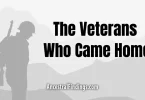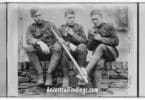For generations, families quietly wondered why a veteran ancestor drank too much, kept to themselves, startled at loud noises, or refused to talk about the war. Some were labeled “nervous,” “moody,” or “difficult.” Others disappeared from family life altogether — emotionally, or sometimes physically.
But we now understand what they couldn’t name: post-traumatic stress disorder, or PTSD.
Though the term didn’t exist until decades later, the effects were already showing. And for family historians, this hidden aftermath of war can explain behaviors, disappearances, and long-standing family rifts.
Before It Had a Name
PTSD wasn’t officially recognized by the medical community until 1980. But its early names tell a story all their own:
- “Soldier’s heart” during the Civil War
- “Shell shock” in World War I
- “Battle fatigue” or “combat exhaustion” in World War II
- “Vietnam stress syndrome” in the 1970s
Each term reflected not just the times, but the struggle to fully understand what war could do to a person’s mind and spirit.
If your ancestor served in a war and returned “different,” there’s a good chance you’re seeing early signs of PTSD — even if no one called it that.
Tracing the Patterns Through Family History
You might find hints of post-war trauma in:
- A veteran who moved frequently and never settled
- Sudden divorce or estrangement after returning home
- Alcohol abuse or hospitalizations
- Disciplinary records from a VA hospital or military court
- Obituaries that mention “rest homes” or long-term care
- Children raised by grandparents or other relatives
Sometimes these patterns ripple forward — affecting relationships for generations without anyone ever realizing where it began.
By identifying them, you’re not placing blame. You’re offering context, and sometimes compassion, to people who didn’t have the words or tools to explain their pain.
The Hospitals That Tried to Help
If your ancestor was treated for mental illness or emotional distress after a war, there may be a paper trail — although not always easy to access.
Look for:
- VA hospital records (many were established after WWI and expanded after WWII)
- State hospital records (especially for Civil War or Spanish-American War veterans)
- Pension files with references to mental instability or emotional trauma
- Guardianship documents, where a family member was appointed due to incompetence
- Newspaper articles, particularly in small towns, that noted court hearings or unusual disappearances
Access to mental health records may be restricted by privacy laws, but clues often leak through in pension papers or property transfers — especially when someone was institutionalized or deemed unfit to manage their affairs.
When the Pain Was Passed Down
In many families, post-war trauma didn’t end with the veteran. It shaped the way children were raised, how affection was expressed, and whether families stayed together or fractured.
You may notice:
- Grandchildren who never met the veteran
- A family “black sheep” who was never talked about
- Multiple generations with strained parent-child relationships
- Stories that don’t add up — with gaps, confusion, or purposeful silence
Sometimes these family mysteries aren’t mysteries at all — they’re wounds that never fully healed.
As genealogists, we aren’t just keepers of dates and documents. We’re sometimes the first in our line to recognize patterns that were once buried under silence.
A Deeper Kind of Record
One of the most meaningful ways to explore this subject is to include it in your notes — sensitively. It’s okay to say something like:
“After returning from service in France, Charles appears to have lived in various boarding houses and was arrested twice for public intoxication. These events began shortly after the war and may reflect difficulties adjusting to post-war life.”
You’re not diagnosing anyone. You’re giving future generations a fuller view of who this person was — not just what they endured, but how they tried to carry it afterward.
Where to Look for Clues
- Pension records (especially for Civil War, WWI, and WWII veterans)
- VA hospital admission lists
- State hospital reports (archived by state historical societies)
- City directories listing asylums or rest homes as a place of residence
- Court records for guardianship, commitment, or competency hearings
- Family letters, if preserved — especially if they hint at illness, silence, or fear
You might also try searching by name + the term “insane,” “rest home,” “soldier’s home,” or “sanitarium” in newspaper archives. These words reflect the era and can uncover records modern search terms might miss.
Remembering Them With Grace
Not every story ends with peace. But understanding what came home with the soldier helps explain so much of what happened after the uniforms were packed away.
It doesn’t change the facts, but it can change how we carry them.
If your family has one of these quiet stories — a veteran who vanished, who couldn’t speak, or who struggled until the end — know this:
They weren’t weak. They weren’t failures.
They were people who went through something unspeakable and tried, in their own way, to keep going.
Your work gives them a voice — one they never had the chance to use in their lifetime.






